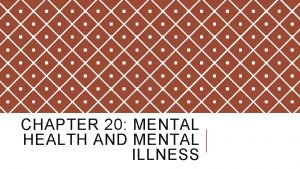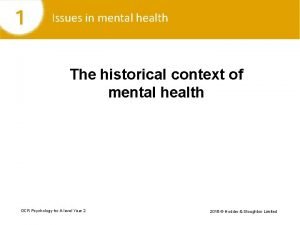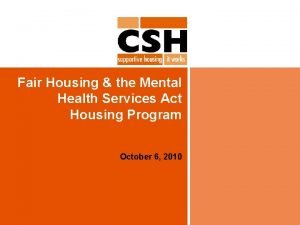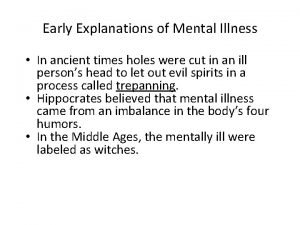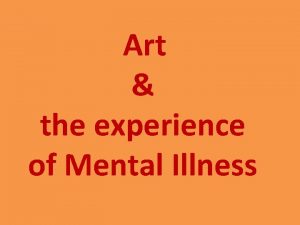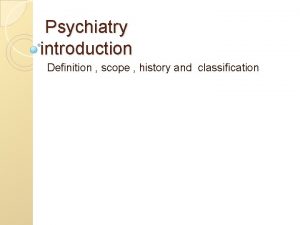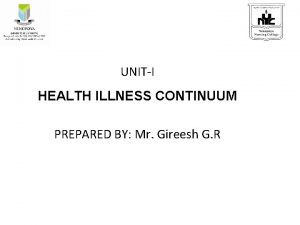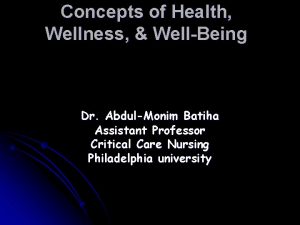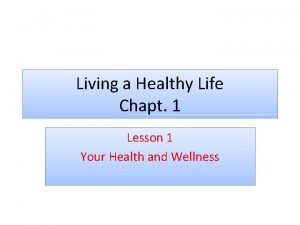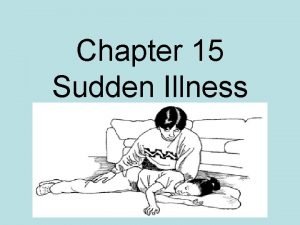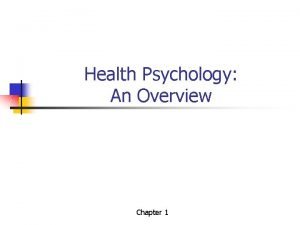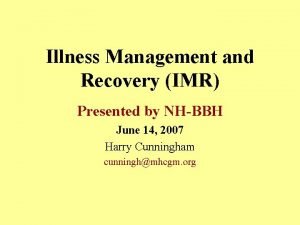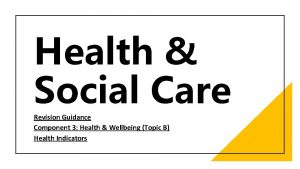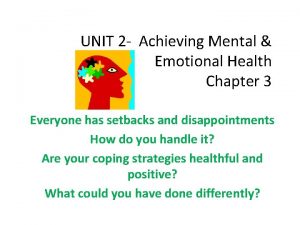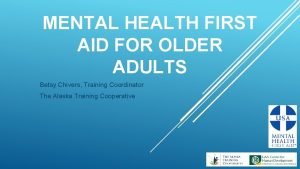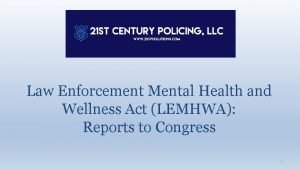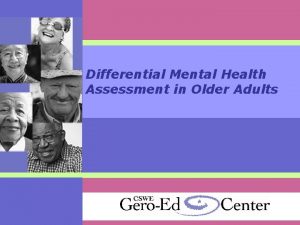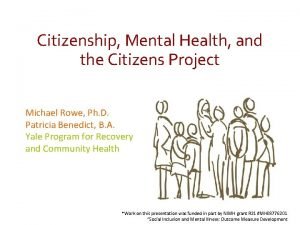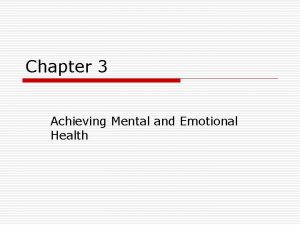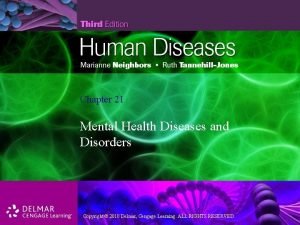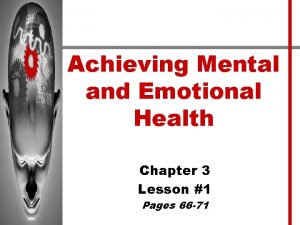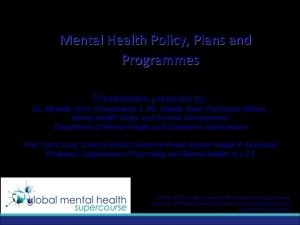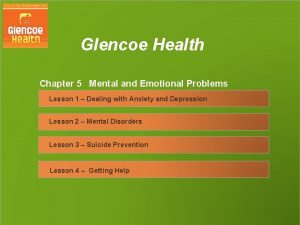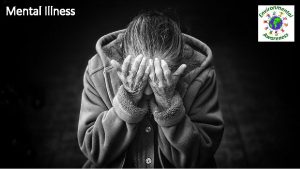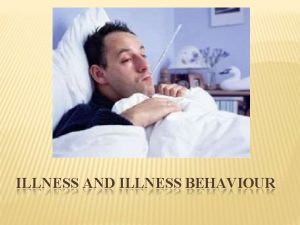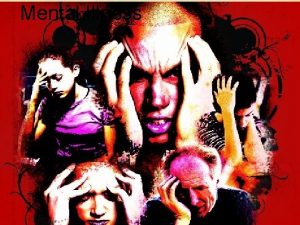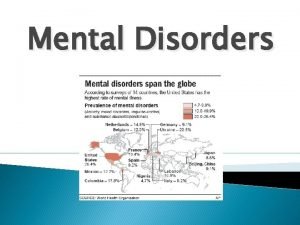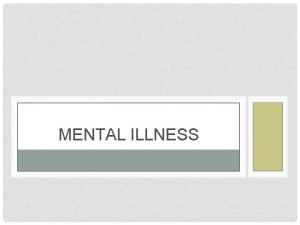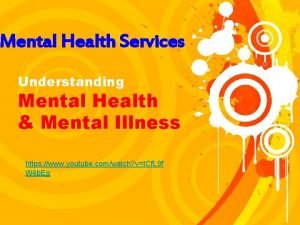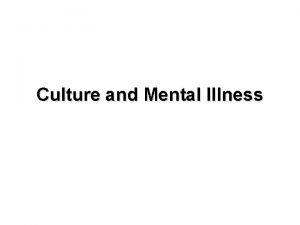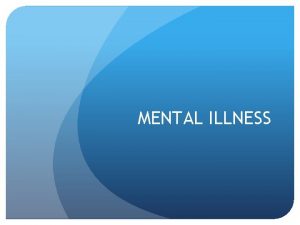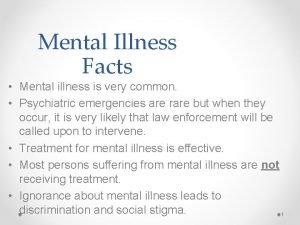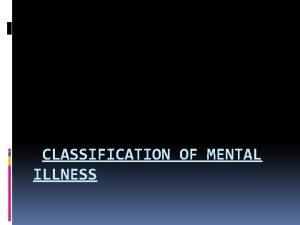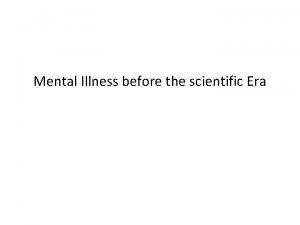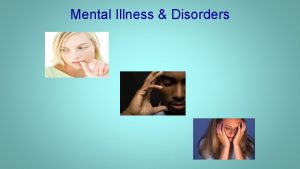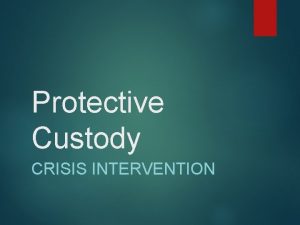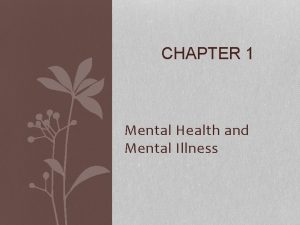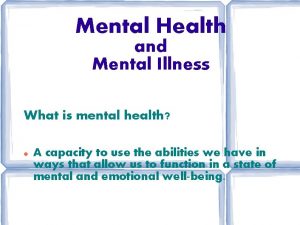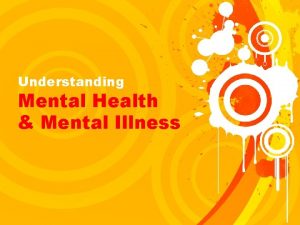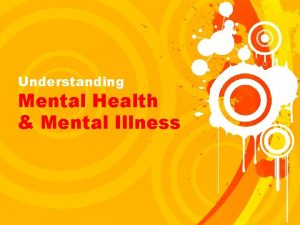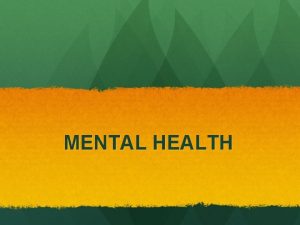Mental Health and Mental Illness People who are































- Slides: 31

Mental Health and Mental Illness • People who are mentally healthy - experience stress, frustrations, feelings of self-doubt, failure, and rejection. What distinguishes the mentally healthy from someone who is not mentally healthy is their resilience. Resilience is a person’s ability to recapture their sense of emotional wellness within a reasonable time using a variety of coping strategies. (An example of resilience – If your partner breaks up with you, are you able to overcome this emotionally and eventually start seeing other people? )

Characteristics of a Mentally Healthy Person · · · • hopefulness about opportunities and life’s challenges persistent in achieving one’s goals practical/realistic about goals as well as their strengths and weaknesses responsible for own personal behaviour respect own needs and the needs of others healthy self-esteem / positive self-concept healthy self-confidence ability to manage stress effectively ability to work productively support network (family, friends, mentors) healthy attitude towards life’s problems and difficulties seeks help / advice when needed

Maslow’s Hierarchy of Needs • http: //www. youtube. com/watch? v=EIao 6 j. O 9 Q 7 w&feature=related • http: //www. youtube. com/watch? v=Qxd. Nz. OV RAm. A&feature=related

Self-Survey on Well Being • Complete the Self-Survey on Well Being and then calculate the results • Scoring • The number you circled is your score for the question. Add your scores in each of the two sections and divide each sum by the number of questions in the section.

Self-Survey on Well Being Life Purpose and Satisfaction: _______ divide by 17 = ______ Self-Confidence During Stress: _____ divide by 15 = ______ · Combined Well Being: (add scores for both) ______ divide by 32 = ______ Each score should range between 1. 00 and 7. 00 and may include decimals (for example 5. 15).

Self-Survey on Well Being Interpretation of Results: • VERY LOW: 1. 00 TO 2. 49 • MEDIUM LOW: 2. 50 TO 3. 99 • MEDIUM HIGH: 4. 00 TO 5. 49 • VERY HIGH: 5. 50 TO 7. 00

The National Mental Health Association describes mentally healthy people as those who: • Feel comfortable about themselves. They are not overwhelmed by their own feelings, and they can accept many of life’s disappointments in stride. They experience all of the human emotions (for example, fear, anger, love, jealousy, guilt, joy) but are not overcome by them.

The National Mental Health Association describes mentally healthy people as those who: • Feel right about other people. They feel comfortable with others and are able to give and receive love. They are concerned about the well-being of other people and have relationships that are satisfying and lasting.

The National Mental Health Association describes mentally healthy people as those who: • Are able to meet the demands of life. Mentally healthy people respond to their problems, accept responsibility, plan ahead without fearing the future, and are able to establish reachable goals.

Guess These Simple Phobias • Technophobia • Sciophobia • Decidophobia • • • Fear of…technology Fear of…shadows Fear of…decisions (“making decisions”) Nyctophobia Fear of…nights Electrophobia Fear of…electricity Topophobia Fear of…performing (“stage fright”) Triskaidekaphobia Fear of…number thirteen (#13) Gatophobia Fear of…cats Hydrophobia Fear of…water

Guess These Simple Phobias • • • Spermophobia Fear of…germs Cynophobia Fear of…dogs Aerophobia Fear of…flying Agoraphobia Fear of…open space Claustrophobia Fear of…small / enclosed spaces Apiphobia Fear of…bees Gamophobia Fear of…marriage Scholionophobia Fear of…school Astrapophobia. Fear of…lightening Pyrophobia Fear of…fire

Mental illness Definition • Mental illness is a disturbance in thoughts and emotions that decreases a person’s capacity to cope with the challenges of everyday life.

Mental Illness Misconceptions • People with mental illness are all potentially violent and dangerous. • · In reality people with mental illness are no more dangerous than people who do not experience mental illness. (Canadian Mental Health Association, Ontario Division, 2000) • · People with diseases such as schizophrenia are more likely to be violent towards themselves

Mental Illness Misconceptions • People with mental illness are somehow responsible for their condition. • · Wrongfully characterized as a weakness or character flaw • · Occurs all over the world in all races, in all cultures, and in all social classes • · Often there are biological, chemical or genetic factors that contribute to the mental illness

Mental Illness Misconceptions • People with mental illness have nothing positive to contribute. • · Throughout history, people with serious mental health problems have been leaders and visionaries • · Examples in every area: politics, culture, academics, business, athletics, arts and science

FAMOUS PEOPLE WITH MENTAL ILLNESS • JIM CAREY - Depression

FAMOUS PEOPLE WITH MENTAL ILLNESS • JANET JACKSON – Obsessive Compulsive Disorder

FAMOUS PEOPLE WITH MENTAL ILLNESS • Ben Stiller - Bipolar manic depression

FAMOUS PEOPLE WITH MENTAL ILLNESS • ROBIN WILLIAMS – Bipolar Disorder

FAMOUS PEOPLE WITH MENTAL ILLNESS HARRISON FORD – “INDIANA JONES” • Clinical Depression

FAMOUS PEOPLE WITH MENTAL ILLNESS • SARAH MCLACHLIN - Depression

RECOVERING FROM MENTAL ILLNESS • http: //www. youtube. com/watch? v=Vp. UW 0 u d. Gk. Fs

FAMOUS PEOPLE WITH MENTAL ILLNESS • ABRAHAM LINCOLN, ERNEST HEMINGWAY, BILLY CORGAN, BROOKE SHIELDS, PRINCESS DIANA, DREW CAREY, HARRISON FORD, HEATH LEDGER, J. K. ROWLING, JIM CAREY, KURT COBAIN, OWEN WILSON, ROSIE O’DONNELL, TERRY BRADSHAW, TRENT REZNOR, WINSTON CHURCHILL, VINCENT VAN GOUGH TO NAME A FEW.

What is Suicide? 1. The act or an instance of intentionally killing oneself. 2. The destruction or ruin of one's own interests: It is professional suicide to involve oneself in illegal practices. 3. One who commits suicide.

Who is at risk? People likely to commit suicide include those who: • are having a serious physical or mental illness, • are abusing alcohol or drugs, • are experiencing a major loss, such as the death of a loved one, unemployment or divorce, • are experiencing major changes in their life, such as teenagers and seniors, • have made previous suicide threats.

Why do people commit Suicide? • feel that life is unbearable • extreme sense of hopelessness, helplessness, and desperation • may hear voices or have delusions which prompt them to kill themselves. • Often, they are reaching out for help.

What are the danger signs? • repeated expressions of hopelessness, helplessness, or desperation, • behaviour that is out of character, such as recklessness in someone who is normally careful, • signs of depression - sleeplessness, social withdrawal, loss of appetite, loss of interest in usual activities, • a sudden and unexpected change to a cheerful attitude, • giving away prized possessions to friends and family, • making a will, taking out insurance, or other preparations for death, such as telling final wishes to someone close, • making remarks related to death and dying, or an expressed intent to commit suicide. An expressed intent to commit suicide should always be taken very seriously.

Preventing a suicide attempt • If you are concerned about someone, take action and talk to them in a safe place (listen attentively without making judgments) • Ask if they have a plan? How and when they intend to kill themselves? • Admit your concern and fear for them • Talk about available resources (e. g. – family, friends, community agencies, crisis centres) that can provide support • Make a plan with the person for the next few hours or days, be available for them, make calls for them if needed • Confidentiality is important, but if life is in danger you must seek medical help for them

Preventing a suicide attempt • http: //www. youtube. com/watch? v=i. Ca. Mpd 2 L 2 k. Q

What to do if you are feeling Suicidal? • call a crisis telephone support line, • draw on the support of family and friends, • talk to your family doctor; he/she can refer you to services in the community, including counselling and hospital services, • set up frequent appointments with a mental health professional, and request telephone support between appointments, · get involved in self-help groups, • talk every day to at least one person you trust about how you are feeling, • think about seeking help from the emergency department of a local hospital, • talk to someone who has 'been there" about what it was like and how he/she coped, • avoid making major decisions which you may later regret.

Health Test Topics • • • • Define a Mentally Healthy Person What is Stress? Describe the Four Stages of “Fight or Flight” Response What is a Stressor? Types of Stressors (emotional, physical, spiritual, intellectual, environmental) Three Positive Adaptive Coping Strategies Three Negative Maladaptive Coping Mechanisms Describe Three Stress Management Techniques What is Mental Illness? Describe Two misconceptions regarding Mental Illness What is Suicide? Who is at risk of suicide? Why do people commit suicide and what are the danger signs? How can you help to prevent a suicide?
 Mental health and mental illness chapter 20
Mental health and mental illness chapter 20 Mental health jeopardy questions
Mental health jeopardy questions Insidan region jh
Insidan region jh Historical views of mental illness psychology ocr
Historical views of mental illness psychology ocr Fair housing act mental illness
Fair housing act mental illness Mental illness in ancient times
Mental illness in ancient times Axis 1 and axis 2 disorders
Axis 1 and axis 2 disorders Mark rothko mental illness
Mark rothko mental illness Catherine earnshaw mental illness
Catherine earnshaw mental illness Americanization of mental illness
Americanization of mental illness Classification of mental disorders
Classification of mental disorders Ksi depression
Ksi depression Wellness illness continuum definition
Wellness illness continuum definition Eudemonistic model example
Eudemonistic model example Continuum of health
Continuum of health Type of people media
Type of people media What is a common signal of sudden illness
What is a common signal of sudden illness Illness and wellness continuum
Illness and wellness continuum Illness management and recovery worksheet
Illness management and recovery worksheet Where is the love 2016 lyrics
Where is the love 2016 lyrics Health and social care component 3 health and wellbeing
Health and social care component 3 health and wellbeing The intentional use of unfriendly or offensive behavior
The intentional use of unfriendly or offensive behavior Mental health and older adults
Mental health and older adults Law enforcement mental health and wellness act
Law enforcement mental health and wellness act Mental health and older adults
Mental health and older adults Mental health and citizenship
Mental health and citizenship Chapter 3 achieving mental and emotional health
Chapter 3 achieving mental and emotional health Chapter 21 mental health diseases and disorders
Chapter 21 mental health diseases and disorders Chapter 3 achieving mental and emotional health answers
Chapter 3 achieving mental and emotional health answers Psychology, mental health and distress
Psychology, mental health and distress Mental health policy, plans and programmes michelle funk
Mental health policy, plans and programmes michelle funk Chapter 5 glencoe health
Chapter 5 glencoe health
